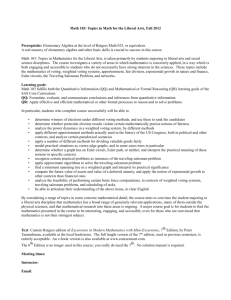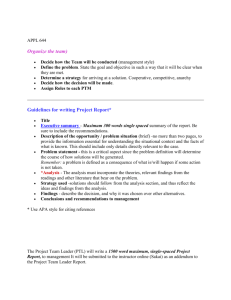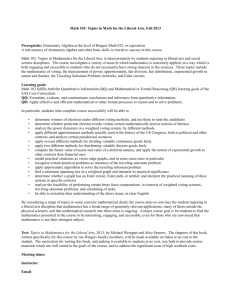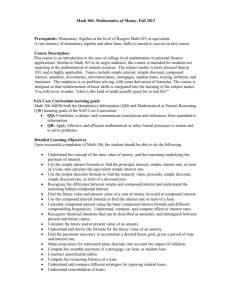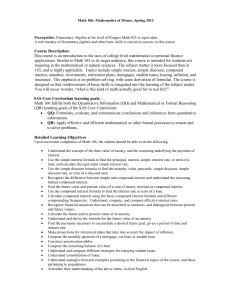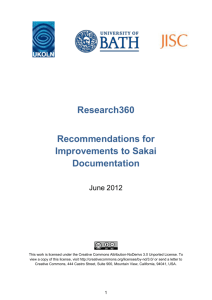528-SP15-Cander-20150116
advertisement
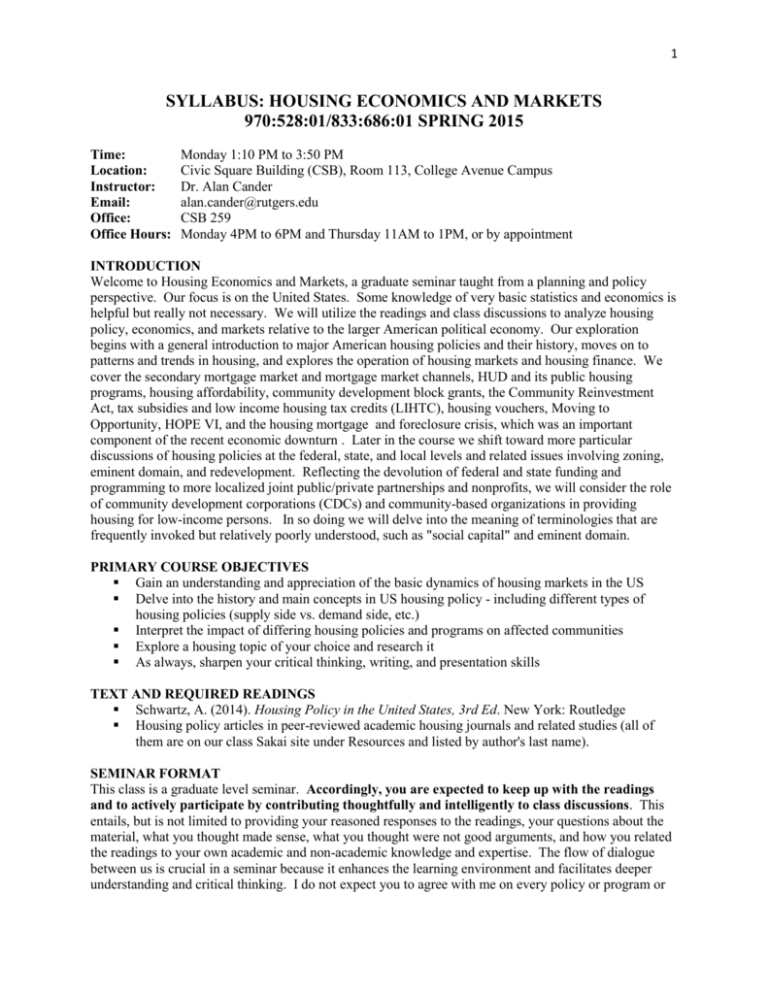
1 SYLLABUS: HOUSING ECONOMICS AND MARKETS 970:528:01/833:686:01 SPRING 2015 Time: Location: Instructor: Email: Office: Office Hours: Monday 1:10 PM to 3:50 PM Civic Square Building (CSB), Room 113, College Avenue Campus Dr. Alan Cander alan.cander@rutgers.edu CSB 259 Monday 4PM to 6PM and Thursday 11AM to 1PM, or by appointment INTRODUCTION Welcome to Housing Economics and Markets, a graduate seminar taught from a planning and policy perspective. Our focus is on the United States. Some knowledge of very basic statistics and economics is helpful but really not necessary. We will utilize the readings and class discussions to analyze housing policy, economics, and markets relative to the larger American political economy. Our exploration begins with a general introduction to major American housing policies and their history, moves on to patterns and trends in housing, and explores the operation of housing markets and housing finance. We cover the secondary mortgage market and mortgage market channels, HUD and its public housing programs, housing affordability, community development block grants, the Community Reinvestment Act, tax subsidies and low income housing tax credits (LIHTC), housing vouchers, Moving to Opportunity, HOPE VI, and the housing mortgage and foreclosure crisis, which was an important component of the recent economic downturn . Later in the course we shift toward more particular discussions of housing policies at the federal, state, and local levels and related issues involving zoning, eminent domain, and redevelopment. Reflecting the devolution of federal and state funding and programming to more localized joint public/private partnerships and nonprofits, we will consider the role of community development corporations (CDCs) and community-based organizations in providing housing for low-income persons. In so doing we will delve into the meaning of terminologies that are frequently invoked but relatively poorly understood, such as "social capital" and eminent domain. PRIMARY COURSE OBJECTIVES Gain an understanding and appreciation of the basic dynamics of housing markets in the US Delve into the history and main concepts in US housing policy - including different types of housing policies (supply side vs. demand side, etc.) Interpret the impact of differing housing policies and programs on affected communities Explore a housing topic of your choice and research it As always, sharpen your critical thinking, writing, and presentation skills TEXT AND REQUIRED READINGS Schwartz, A. (2014). Housing Policy in the United States, 3rd Ed. New York: Routledge Housing policy articles in peer-reviewed academic housing journals and related studies (all of them are on our class Sakai site under Resources and listed by author's last name). SEMINAR FORMAT This class is a graduate level seminar. Accordingly, you are expected to keep up with the readings and to actively participate by contributing thoughtfully and intelligently to class discussions. This entails, but is not limited to providing your reasoned responses to the readings, your questions about the material, what you thought made sense, what you thought were not good arguments, and how you related the readings to your own academic and non-academic knowledge and expertise. The flow of dialogue between us is crucial in a seminar because it enhances the learning environment and facilitates deeper understanding and critical thinking. I do not expect you to agree with me on every policy or program or 2 how they have been interpreted and, in fact, I welcome differences of opinion. Always be prepared to support your arguments and conclusions with at least a modicum of reason and logic. Doing so in our Bloustein "ivory tower" is more than an intellectual exercise; it helps prepare you for the outside world. CHECK SAKAI OFTEN I expect you to check our class Sakai site frequently to stay informed and on top of the class activities and assignments. I use Sakai to make important class announcements and you are responsible for reading them and being aware to any changes in scheduling or requirements. HOW YOUR GRADE IS DETERMINED A=90-100; B+=87-89; B = 80-86; C+=77-79; C=70-76; 69 and less = F Class Participation Response Paper Midterm Final Term Paper Presentation 10% 10% 20% 15% 35% 10% RESPONSE PAPER Each student is required to prepare a 5- to 7-page, double-spaced Response Paper to one week's worth of required readings. You may choose any single week's readings from the following weeks: Feb 16, Mar 2, Mar 9, Mar 30, Apr 6, Apr 13, or Apr 20. This paper counts for 10% of your final course grade. I expect it to be written to graduate level standards and to include text citations or footnotes and a bibliography. You may only use the course readings as sources for your paper. Since you are drawing from a week's worth of readings with different authors I am asking you to synthesize your understanding of the main housing-related policy or planning themes/concepts running through those readings. That is not the same as a summary or synopsis. I am also asking you to provide some type of reaction to what you have read, which may be your reasoned agreement or disagreement with the tenor or direction of the policies. Your reaction may, if applicable, draw from your own previous academic or work experiences. A good rule of thumb is to spend about three-quarters of the paper on your synthesis and perhaps a quarter of it on your reaction. Due Dates: Response papers for the Feb 16th class, for example, are due Feb 16th in class in hard copy and on Sakai by noon. MIDTERM The midterm will contain both short answer questions and essay questions and will be held in class. It counts for 20% of your final grade. The exam is scheduled for March 23rd. FINAL This is a Take-Home Final on a housing-related policy/planning topic that will be passed out in class on May 4th and due on May 7th on Sakai by 9 PM. It counts for 15% of your grade and is not to exceed 6 double-spaced pages. TERM PAPER Here you have wide latitude to research a housing-related topic and write a paper in the neighborhood of 18 to 20 pages, double-spaced with full text citations or footnotes and a full bibliography. Please use a minimum of 8 to 10 sources drawn from books, agency white papers, think tank white papers, and peerreviewed, academic journals. 3 If you are in the MCRP program you might want to write a paper on some housing policy or program that interfaces with urban planning theory or urban design and analyze its success or failure relative to sound design or planning principles. This type of paper might take the form of a critique or a comparison of the program's pros and cons relative to planning principles. If you are in the MPP or MPAP program you might want to write a policy-critique-type paper that concentrates on difficulties in meeting policy goals or carrying out program implementation. This type of paper might end with a series of recommendations or elaborate on where you see the need for further research or a reconsideration or reframing of the problem. All paper topics must be approved by me. Papers are due on April 27th in class in hard copy and on Sakai by 12 noon. Alternatively, some of you - MCRP, MPP, MPAP - might prefer to look at the legal issues presented by various housing programs or initiatives and take a look at how various federal and state courts have adjudicated the associated, or resultant, conflicts. This would include an exploration of case law, perhaps by SCOTUS, a federal district court, or a state supreme court. You could even look at cases at the municipal level. THE PRESENTATION Here you will present your discussion (analysis) from your Term Paper using PowerPoint. I will be available for dry-runs if you feel the need. Many students find this extremely helpful! Presentation length will vary according to our ultimate class size. I will provide more information on Presentation requirements and tips as the semester proceeds. ROAD RULES: PARTICIPATION, ATTENDANCE, CELL PHONES, CIVILITY, DEADLINES We are conducting a seminar and we only meet once per week so your attendance is crucial. I take attendance and expect you to be on time. The only excusable absences are documented illnesses and documented personal or immediate family emergencies, such as a death in the family. If you know you have to be absent and it cannot be avoided please contact me or email me IN ADVANCE and/or use the Rutgers University absence reporting website, which is located at http://sims.rutgers.edu/ssra/. Unexcused absences and/or chronic lateness will lower your Class Participation grade. If you miss class it is your responsibility to get the notes from another student. Cell phones, Ipads, laptops, etc. are to be used in class ONLY for class purposes. Certainly, you may use your laptop for taking notes or to re-read the materials contained in Resources on our class Sakai site. However, if I catch you using your appliances for non-class purposes during our lecture/discussion time, such as texting or searching the web, I will ask you to turn your them off. If you persist, I will ask you to leave and you will receive a zero for the day. It is one thing to ignore me, but I absolutely will not tolerate you being rude to my other students or distracting them from the learning process. That is simply not fair. Disagreements are fine, but please be respectful and civil to one another in terms of demeanor and use of language. If you have a comment or question please raise your hand and do not interrupt others. Discussions on housing policies and housing In my classes, there is no such thing as a "dumb" question. If you do not understand something in the material please feel absolutely free to ask me. Chances are extremely high that you are asking a question the other students want answered. All assignments - papers, exams, presentations - have strict deadlines. They are due when they are due unless you experience a documented illness or documented personal or family emergency that justifies an extension. Late assignments will be severely penalized: one entire grade off per day. 4 Sakai immediately counts papers late that go even one minute over the timed deadline and that will automatically cost you points. In other words, get your work in ON TIME. EXTRA CREDIT I do not give extra credit. Please do not ask me. ACADEMIC INTEGRITY I expect you to know, understand, and live up to Rutgers' standards of academic integrity explained at http://academicintegrity.rutgers.edu/academic-integrity-at-rutgers. See also http;//www.plagiarism.org//. If you have a question about these standards, please see me. Rule of thumb: if you think you may be doing something academically dishonest, you probably are. Your term papers are to be turned in on Sakai and I use the TurnItIn option on Sakai to check for violations of academic integrity. Please do not plagiarize; consequences are severe. SCHEDULE OF READINGS AND ASSIGNMENTS Jan 26 Introduction to the class - no readings assigned Feb 2 Part I: Overview, Housing Markets, and Housing Finance Topic: General Housing Policies Schwartz Ch. 1 Dreier, P. Federal Housing Subsidies - Who Benefits and Why (DREIER on Sakai) Feb 9 Topic: Housing and Housing Markets in the US Schwartz Ch. 2 Feb 16 Topic: Housing Finance Schwartz Ch. 3 Immergluck, D. The Foreclosure Crisis, Foreclosed Properties, and Federal Policy (IMMERGLUCK on Sakai) Apgar, W. Mortgage Market Channels and Fair Lending: An Analysis of HMDA Data (APGAR on Sakai) Paper topic one-page description or outline due in class in hard copy First week for which you can do your Response Paper Feb 23 Part II: Federal Housing Policies Topic: Tax Subsidies and Low Income Housing Tax Credits (LIHTC) Schwartz Ch. 4 & 5 Mar 2 Topics: Public Housing and HOPE VI Schwartz Ch. 6 Popkin, S. A Decade of HOPE VI (POPKIN on Sakai) Mar 9 Topics: Section 8 Projects and Vouchers Schwartz Ch. 7 & 8 DeFilippis, J. and Wyly, E. Running to Stand Still: Through the Looking Glass with Federally-Subsidized Housing in New York City (DEFILIPPIS on Sakai) Midterm Study Guide handed out Mar 16 No Class - Spring Break Mar 23 Midterm Examination Apr 2 Part III: State, Local, and Community Roles in Housing Policy Topics: Overview, Zoning, Land Use, and Eminent Domain Schwartz Ch. 9, first half Ihlanfeldt, K. Exclusionary Land-Use Regulations within Suburban Communities: A Review of the Evidence and Policy Prescriptions (IHLANFEIDT on Sakai) Payne, J. The Paradox of Progress: Three Decades of the Mount Laurel Decision (PAYNE on Sakai) 5 Apr 6 Apr 13 Apr 20 Apr 27 May 4 May 7 Topic: Community Development and Housing Policy Schwartz Ch. 9, second half Swanstrom, T. The Nonprofitization of United States Housing Policy: Dilemmas of Community Development (SWANSTROM on Sakai) Bratt, R. and Rohe, B. Challenges and Dilemmas Facing Community Development Corporations in the United States (BRATT AND ROHE on Sakai) Part IV: Issues in Housing Policy Topics: Race, Discrimination and Segregation Schwartz Ch. 11 Denton, N. Half Empty or Half Full: Segregation and Segregated Neighborhoods30 Years After the Fair Housing Act (DENTON on Sakai) Topic: Poverty Concentration, De-Concentration, and Mixed Income Housing Goetz, E. Housing Dispersal Programs (GOETZ on Sakai) Joseph, M. The Theoretical Basis for Addressing Poverty Through Mixed-Income Development (JOSEPH on Sakai) Jargowsky, P. and Yang, R. The 'Underclass' Revisited: A Social Problem in Decline (Jargowsky on Sakai) Last week for which you can do your Response Paper Topic: Housing Tenure Galster, G. and Santiago, A. Low-income Homeownership as an Asset-Building Tool: What Can We Tell Policymakers? (GALSTER on Sakai) Term Papers Due in class in hard copy and on Sakai by Noon Presentations Held; Take Home Final handed out Take Home Final Due on Sakai by 9 PM Note: Additional readings may be assigned as appropriate.


